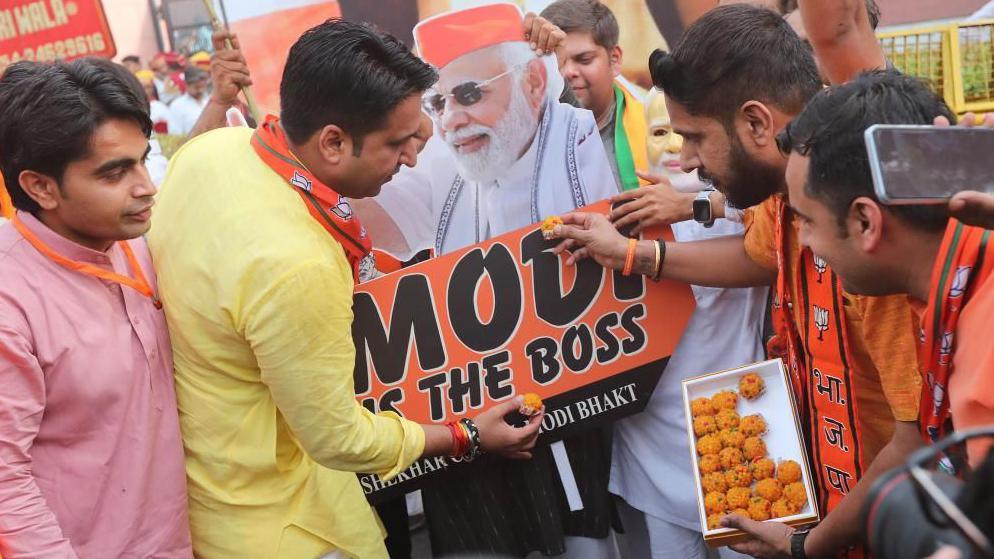Allies back Modi for third term after election setback

- Published
Narendra Modi is set to be India's prime minister for a third time, a day after humbling election results which saw his majority slashed by a resurgent opposition.
Mr Modi was backed to be prime minister again following a meeting with his National Democratic Alliance (NDA) on Wednesday.
The 73-year-old had found himself unexpectedly reliant on the NDA's smaller parties to reach a parliamentary majority after his own party fell short of the 272 needed to form the next government.
However, the opposition - which won 232 seats to the NDA's 293 - has yet to formally concede.
It was holding its own meeting on Wednesday in the capital, Delhi, to discuss next steps.
Mr Modi is likely to be sworn in for a record-equalling third term later this week.
Why India's Modi failed to win outright majority
- Published4 June 2024
BBC India reporters on why some voters said no to Modi
- Published4 June 2024
Mr Modi and his Hindu-nationalist Bharatiya Janata Party (BJP) won 240 seats following the weeks-long, seven-stage election, making them the largest party in the Lok Sabha, India's lower house.
But it is a significantly reduced number for the prime minister: in 2019, the BJP won 303 seats, and Mr Modi had said he was aiming for 370 seats this time round.
Instead, they have had to rely on NDA partners to secure Mr Modi's third term.
According to an NDA release, he was "unanimously" chosen as their leader at the meeting at his Delhi residence, adding they were "committed to serving the poor, women, youth, farmers and exploited, deprived and oppressed citizens of India".
Exactly what concessions its partners may have elicited from the BJP remains to be seen. Ahead of the meeting, there was speculation that demands from more powerful groups may have included ministerial positions in return for their support.
It is the first time Mr Modi will have governed in coalition without his party having an outright majority, and it is unclear what the next five years will look like.
Nilanajan Mukhopadhyay, who has written a biography of Mr Modi, told AFP news agency it would "force Modi to take the point of view of others".
"We shall see more democracy and a healthy parliament," he added.
"He will have to be a leader that he has never been; we will have to see a new Modi."
Meanwhile, the opposition INDIA coalition has been celebrating the results - despite not winning.
Congress president Mallikarjun Kharge hailed the "overwhelming support received by our alliance" and said voters had sent a message opposing the BJP's "politics of hate, corruption and deprivation".
"This is a mandate in defence of the Constitution of India and against price rise, unemployment, and crony capitalism and also to save democracy," his statement on social media added.
Following the NDA's declaration of victory, the White House congratulated Mr Modi and said the US was hoping to work with India to "ensure a free and open" Asia.
This year's Indian election was the largest the world has ever seen. More than 600m people took part - or 66% of the country's eligible voters. Nearly a billion people had registered to vote in total – about one in eight of the global population.
Voting was staggered over seven rounds between 19 April and 1 June for security and logistical reasons. Much of the election took place in extreme and deadly heat as temperatures in parts of India soared to nearly 50C.